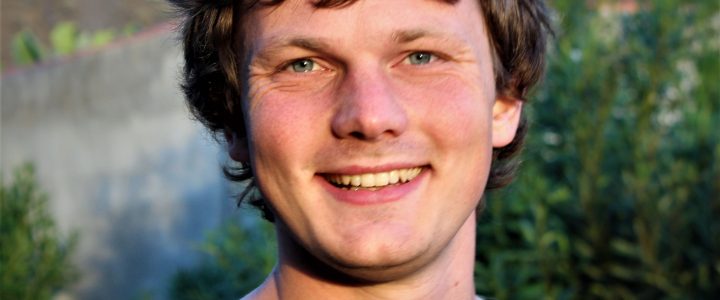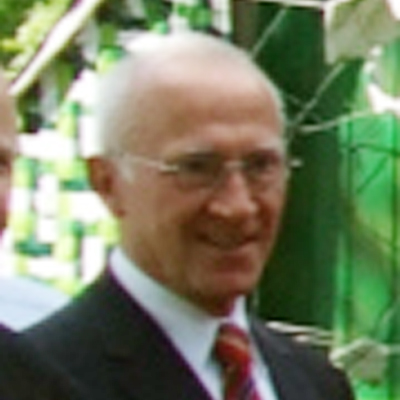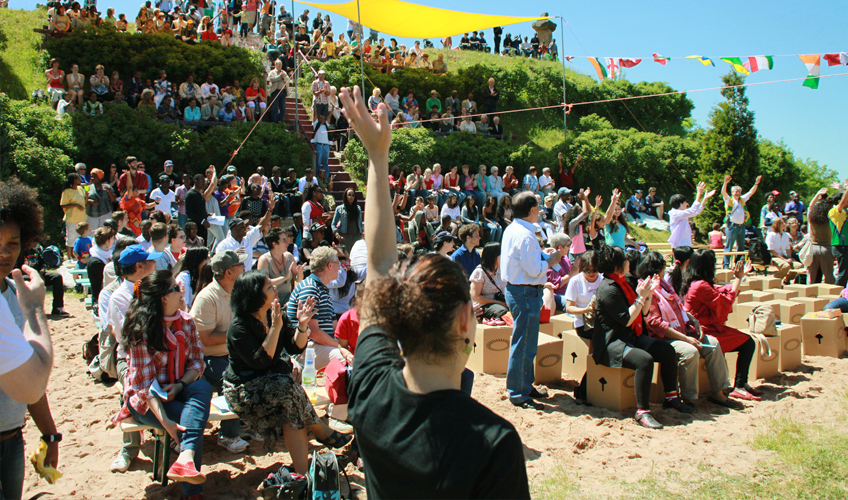Er organisiert die Porgramme und hält den internationalen Karder zusammen.
Steffen Blauth


Er organisiert die Porgramme und hält den internationalen Karder zusammen.
In den letzten Monaten habe ich viel zu dem Thema „Shared Worship Space“ gearbeitet, also die gemeinsame Nutzung von Kirchengebäuden. Wir haben ein kleines Forschungsprojekt durchgefuehrt und mit Pastoren gesprochen, die Kirchengebäude besitzen und andere, die dort als Gäste Gottesdienst feiern. Wir haben herausgefunden, dass etwa ein Drittel aller Gemeinden in Boston Kirchengebäuede gemeinsam nutzen. Ueber 90% dieser Gemeinden teilen das Gebäuede mit Gemeinden unterschiedlicher ethnischer Herkunft. Die örtliche Nähe bietet eine Möglichkeit interkultureller Begegnung und der Überwindung von ethnischer Trennung, die in den USA in keinem anderen Lebensbereich so stark vorhanden ist, wie im christlichen und gemeindlichen Kontext. Ihr könnt euch jedoch vorstellen, dass es oft zu Konflikten und Missverständnissen kommt. Es gibt unterschiedliche Vorstellungen von Zeit, Lautstärke und Sauberkeit. Da viele der Gemeinden die gemeinsame Nutzung als Vermietung ansehen, fehlen oft eine gemeinsame Vision und eine Beziehungsbasis, auf der Unterschiede und Konflikte angesprochen werden können. In den wenigstens Faellen wird die Nähe zueinander genutzt, um voneinander zu lernen und sich gemeinsam als Botschafter des Reiches Gottes zu präsentieren.
Ich habe einen Artikel über dieses Forschungsprojekt geschrieben, dieser ist, leider nur auf Englisch, auf folgendem Link zu finden: www.egc.org/err74.
Dr. Bianca Duemling, Assistant Director of Intercultural Ministries, Emmanuel Gospel Center
The effects of globalization and the influx of immigrants after “The Immigration & Nationality Act” of 1965 led to an accelerated racial and ethnic diversification of American society. Sociologists predict that by the year 2050, the majority of United States residents will be people of color.[1] This diversity is also reflected in the church landscape. There has been a significant growth of immigrant churches over the past 40 years. For example, in the combined communities of Boston, Cambridge, and Brookline, Massachusetts, 82.5% of the churches are minority, immigrant churches.[2] At the Emmanuel Gospel Center, this growth is being described as the “Quiet Revival” because it began without being noticed by the broader Christian Community.[3]
Moreover, suburban churches are diversifying due to demographic changes in their neighborhoods. Christianity is no longer a “White man’s religion,” neither in the U.S. nor worldwide. There is a worldwide shift of the center of Christianity. Consequently, African, Asian and Latin American Christians will constitute 71% of the world’s Christian population by 2050.[4]
Thus, in the global and local church context there is an inevitable necessity to develop intercultural competencies among leaders in order to lead according to “Unity in Diversity.” Moreover, it is time to recognize that each culture and ethnicity brings a unique leadership gift to the church. These gifts ought to be discovered, articulated and celebrated.
The unfortunate reality is that over 90% of churches in the United States are racially segregated and in general, there is little interaction between churches of different ethnic background.[5] From the perspective of minority and immigrant churches, the explanation of this reality is deeply rooted in the history of racism in the U.S., as well as in the desire of immigrants regarding cultural preservation in a new land. The separation of the “white” church is historically rooted in a sense of superiority in whiteness. Furthermore, today the case for separation is often based on the “Homogeneous Unit Principle” (HUP). Followers of the HUP argue that people should enhance efforts at evangelism rather than spending time trying to change segregation, racism, or address the underlying root issues and conditions that separate the church.[6]
The question remains: why should we invest in diverse leadership? Biblically and socially there is a need to create diverse partnerships. God created one race, the human race (Genesis 1:26-27). There is no distinction between humankind. As His people, we need to embrace this Godly foundation which is emphasized throughout scripture (e.g. Galatians 3:28). The most powerful image of the need to form partnership across ethnic, social and racial lines is Apostle Paul’s writing on the Body of Christ in 1 Corinthians chapter 12.
Furthermore, diverse leadership based on equality is a manifestation of the Church’s unity and a witness of God’s love for the people and the intercultural nature of God’s Kingdom. As written in John 17:23, “[…] so that they may be brought to complete unity. Then the world will know that you sent me and have loved them even as you have loved me” (NIV).
And finally, only a diverse expression of the Church can be relevant in an urban context to address the multiple challenges of urban society, such as racism, youth violence, unemployment, school drop outs, etc.
The Diverse Leadership Project began as the Emmanuel Gospel Center and Grace Chapel[7], a suburban church in Lexington, Mass. whose membership is diversifying, decided to work together. In 2009, a diverse learning team[8] with members from both organizations was formed to explore the issue over a period of 10 months, launching what we called “The Diverse Leadership Project.” Currently, The Diverse Leadership Project seeks to understand the leadership styles of various ethnic communities, with a view toward understanding how they impact church development and interchurch relationships, and how they can increase the intercultural competencies of church leaders broadly.
In addition to the learning team sessions, one objective was to interview leaders of different ethnic backgrounds and listen to their personal leadership stories. The experience of this learning team can only be seen as a brief introductory process and starting point of a much needed and broader investigation on the topic of diverse church leadership development over the next years.
The value of interviews with leaders from a variety of ethnic communities was recognized by all members as a crucial part to expand an understanding for each other’s leadership styles and priorities in order to develop equal partnerships.

Geschäftsmann.
Leitet das Kuratorium mit ruhiger Hand. Ihm entgeht kein Ball.

Geschäftsmann.
Zögert nie, wenn er einen freien Weg sieht.

Lehrerin und Stadtverordnete.
Sorgt für den Ausgleich.

Pastorin.
Hervorragende Trikotschneiderin mit estnischem Background.



Pastorin.
Expertin Alte Hasin, die für ausreichend Know-How sorgt.